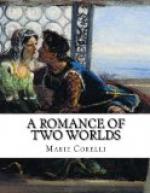“Breakfast shall be served at the instant,” she said, rubbing her fat hands together; “but to disturb you when you slept—ah, Heaven! the sleep of an infant—I could not do it! I should have been wicked!”
I thanked her for her care of me; I could have kissed her, she looked so motherly, and kind, and altogether lovable. And I felt so merry and well! She and the servant retired to prepare my coffee, and I proceeded to make my toilette. As I brushed out my hair I heard the sound of a violin. Someone was playing next door. I listened, and recognised a famous Beethoven Concerto. The unseen musician played brilliantly and withal tenderly, both touch and tone reminding me of some beautiful verses in a book of poems I had recently read, called “Love-Letters of a Violinist,” in which the poet [footnote: Author of the equally beautiful idyl, “Gladys the Singer,” included in the new American copyright edition just issued.] talks of his “loved Amati,” and says: “I prayed my prayer. I wove into my song
Fervour, and joy, and
mystery, and the bleak,
The wan despair that
words could never speak.
I prayed as if my spirit did belong
To some old master who was wise
and strong,
Because he lov’d
and suffered, and was weak.
“I trill’d the notes, and
curb’d them to a sigh,
And when they falter’d
most, I made them leap
Fierce from my bow,
as from a summer sleep
A young she-devil. I was fired
thereby
To bolder efforts—and
a muffled cry
Came from the strings
as if a saint did weep.
“I changed the theme. I dallied
with the bow
Just time enough to
fit it to a mesh
Of merry tones, and
drew it back afresh,
To talk of truth, and constancy,
and woe,
And life, and love,
and madness, and the glow
Of mine own soul which
burns into my flesh.”
All my love for music welled freshly up in my heart; I, who had felt disinclined to touch the piano for months, now longed to try my strength again upon the familiar and responsive key-board. For a piano has never been a mere piano to me; it is a friend who answers to my thought, and whose notes meet my fingers with caressing readiness and obedience.
Breakfast came, and I took it with great relish. Then, to pass the day, I went out and called on Mrs. Everard’s friends, Mr. and Mrs. Challoner and their daughters. I found them very agreeable, with that easy bonhomie and lack of stiffness that distinguishes the best Americans. Finding out through Mrs. Everard’s letter that I was an “artiste” they at once concluded I must need support and patronage, and with impulsive large-heartedness were beginning to plan as to the best means of organizing a concert for me. I was taken by surprise at this, for I had generally found the exact reverse of this sympathy among English patrons of art, who were never tired of murmuring the usual platitudes about there being “so many musicians,” “music was overdone,” “improvising was not understood or cared for,” etc., etc.




